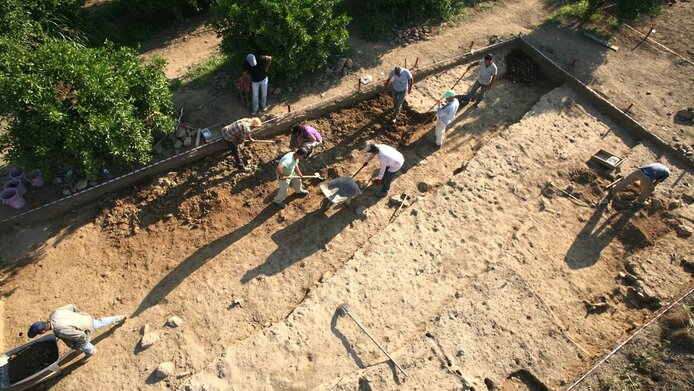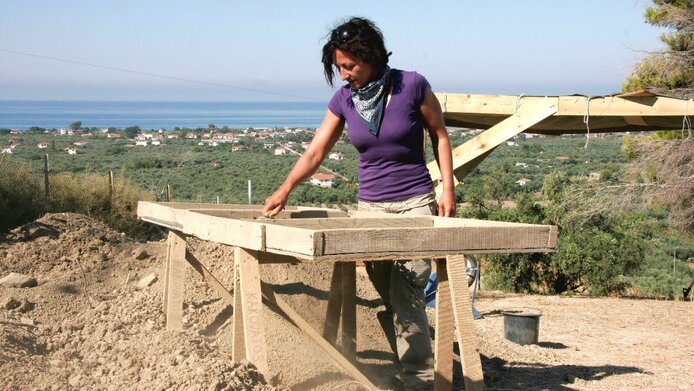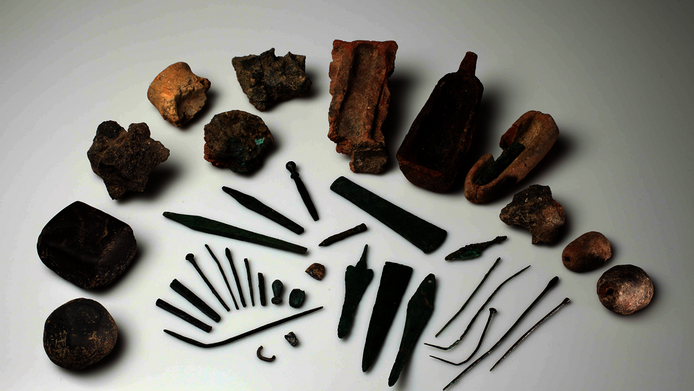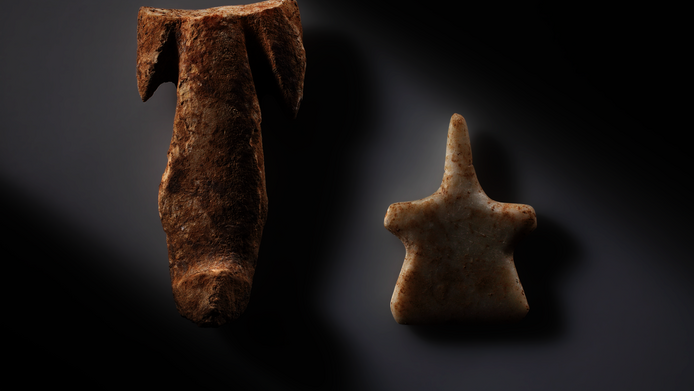“The cradle of civilisation is found in the Orient”
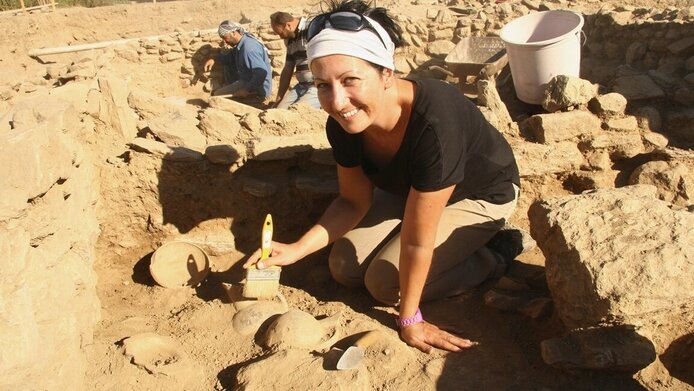
In 2015, Barbara Horejs caused a stir in the research world: she had found out that the adoption of a sedentary lifestyle occurred a great deal earlier than previously thought. The transition from the age of nomad hunter-gatherers to that of farming communities in durable settlements marks the evolution of humankind to this day. A settled way of life and urbanisation – these are the two phenomena in human history on which our current civilisation is based. The archaeologist from Vienna has made these two topics the focus of her research.
From nomads to crop farmers
Barbara Horejs completed her six-year FWF-funded START project at the end of 2016. In the course of her research she discovered that migrants from the Middle East had settled in western Turkey and established crop cultivation there as far back as 8,700 years ago. From Turkey, the new lifestyle spread to Europe via the Balkans. Hence, not only did people first settle down much earlier than hitherto assumed, but this evolution was also triggered by migration from the Orient to Europe – at a time when there were still hunter-gatherer groups roaming the Aegean region. “Migration brings civilisation”, is how Barbara Horejs sums up her findings.
Heated debates
This new insight caused some heated debates among the archaeological community, as it had previously been assumed that the transition from the hunter-gatherer to the farming lifestyle had taken place indigenously. Horejs was able to submit evidence to the contrary: pioneers from the Levant and the Middle East brought with them the know-how for this new way of life and established it here. A further question that Horejs will now continue to work on: how did the new lifestyle arrive on the European continent? It seems that the Balkans played a pivotal role in this context.
Rewriting history
Through her work, the Director of the Institute for Oriental and European Archaeology, established in 2013 at the Austrian Academy of Sciences, was able to show that the roots of the two decisive steps taken by humankind – sedentism and urbanisation – were to be found in the Orient. With her research team she has published 52 papers and two books on this issue in recent years, and three more books are in the pipeline. “The history of this region needs to be rewritten”, concludes the archaeologist.
Boosted by a START award
Her ground-breaking work was made possible by the START award which Horejs received from the FWF in 2010. The START Programme enables excellent young researchers to conduct their research over several years with financial security. In the same year, the archaeologist also received an ERC Starting Grant from the European Research Council. “That meant we could set up a highly specialised research group on topics never dealt with in Austria before”, Horejs recounts happily. This research group involves twelve different scientific disciplines. – A logistic challenge for the principal investigator, since her intention is that the group should also evaluate their data collectively.
Migration from the Levant …
For ten years by now, Horejs has been conducting systematic investigations in western Anatolia - on the Çukuriçi Höyük or “mound in the pit” – where she obtained new data and gained new insights. It was almost by accident that she hit upon the oldest-known Neolithic settlement in the Aegean, dating back 8,700 years, during excavations near Ephesus. There she found the material facts to bolster her thesis: solidly built houses, fireplaces and animal bones indicating the rearing of domestic pigs. “Domestic pigs were hitherto unknown in the interior of Anatolia, but they did exist in the Levant and in Upper Mesopotamia”, explains Horejs to stress the significance of this find. The material culture and techniques in this first settlement also point to the fact that the pioneers who brought domesticated cereal crops came from the Orient.
… across the sea
As palaeogeographers have found out, Çukuriçi Höyük was situated on the coast at that time and had direct access to the Aegean, while the site of ancient Ephesus was still below sea level. This is another reason why the researchers assume that the migrants arrived on boats. Horejs plans to devote the coming years to unearthing the reasons for this migration. She presumes it was due to climatic changes or to population pressure generated by longer life expectancies and lower infant mortality among sedentary farmers.
Significance of research funding
Barbara Horejs is “infinitely grateful” to the FWF for the START award: “I would not otherwise be the director of this huge institute today, and I wouldn’t have had the opportunity to establish this research group and follow through with the projects as we did”, she emphasises. She deems this FWF grant particularly important for the humanities and social sciences. “If I had not received the START award in 2010, I would have gone abroad”, notes Horejs.
From Athens, via Berlin …
The Vienna-born scholar returned to her native city only in 2005 – after seven years of studies in Athens and at the Freie Universität Berlin. She had felt that the study programme of pre- and early history in Vienna focused too much on Europe, and even then she was already more interested in the region of Greece, Anatolia and the Orient, which is why she soon switched to the Freie Universität Berlin after a stay in Greece with Erasmus. “The German Academic Exchange Service had great programmes and brought many young people to Berlin”, says Horejs, recalling the open international climate there.
… back to Vienna
It was her thesis supervisor who provided the impetus for her to go back to Vienna after all. He felt that Vienna, as a gateway to the Balkans, was the ideal place for her to build her own branch of research. And he encouraged her to apply to the FWF for a stand-alone project. In this way, the FWF enabled her to start her excavations in western Anatolia. “It was a pilot project, because people were only doing research on Antiquity in Ephesus at the time, and nothing was known about the time before that”, she remembers. Then came the second stand-alone project, the START project and her research developed briskly from there.
Funding regime for young scientists is missing
Horejs regrets that young scientists have a stonier road before them today. “Under today’s circumstances I would have been unable to apply for a stand-alone project, because I wouldn’t have had the required track record”, says the 40-year-old archaeologist. Although she values the FWF’s strict criteria for stand-alone projects, she is afraid they translate into fewer chances for young postdocs. “It leads to a situation where we older ones apply on behalf of the young, thus returning to a system from the 1950s which we really wanted to abandon. What is missing is a regime enabling the young to put their names against their ideas”, is how Horejs describes what she would like to see.
Interest in archaeology still strong
She knows the precarious situation young scholars often find themselves in from her own experience. “Until I was offered the position at the
Academy of Sciences in 2013, I didn’t have a single genuine contract of employment”, she remembers. And yet: the number of students taking pre- and early history courses demonstrates that there is still a very strong interest in archaeology. Horejs would advise young people not to base their choice of study course on short-term labour market forecasts, but to follow their passion and interest. “If you’re good, you will make it”, she says with conviction. In addition she recommends that students find a mentor. “You have to find some top-notch researcher early on, someone with international connections, and latch on to them”, she advocates.
Encouraging women
Another important task Horejs sees for herself as a mentor is the choice of subjects. Among women in particular she observes a tendency towards modesty. “Alpha males like to go for the big themes that sit well with the media, and women like to do the important work in the background.” She perceives a lack of self-confidence among young women students and sees it as part of her remit as a mentor to boost their confidence. “I am not saying that women are actively held back in the world of science. But the system of the particularly vocal, pushy and self-confident old men elbowing their way ahead still works remarkably well”, notes Barbara. So what does one need in the science arena? “You have to be confident and must not allow yourself to be intimidated by hostile voices.” These are aspects Horejs also tries to include in her teaching: in her seminar, women students learn to assert themselves by being obliged to defend their ideas.
“We need the women’s quota”
Over the years, Barbara Horejs’ own take as to a women’s quota in decision-making bodies has changed. “We need the quota! Consistency, conviction and performance are not sufficient”, she claims. “Women are simply still in a minority.” She also perceives an obligation for women to take action and raise their voices in protest, whenever there is yet another decision-making body with just a single token woman on it. In addition, Horejs would like to see more tangible plans to support women, for instance financial incentives which university departments might use to bring women into senior positions. Her vision for science does not include the need for a battle of the sexes, because network building is based on skills, scientific issues and objectives, and gender does not come into it. “But for this we need gender equality, which is something we don’t have right now,” she observes.
Time of transformation
Horejs herself knew that she wanted to be an archaeologist as of the age of 14. Why the fascination? “The past holds the key to the present”, says the scientist, “this seemingly banal truth becomes all the more important if the present is very complex.” For many years, her work has been focused on a time of social transformation. In the present, she also perceives many signs of change such as social tension. One more reason for her to support the humanities and social sciences. “The issues that we face today as a society concern the essence of life. The economy is not going to be able to provide answers to these questions”, says Horejs, who considers the debate about ‘luxury’ academic subjects as being very short-sighted. “Oriental studies have shown how quickly a so-called ‘luxury’ subject can become pertinent”, is the example she gives with a wry smile.
Everything is finite
“Human history has seen a great deal of social change; we have gathered facts on these phenomena and we analyse them. But there is something we need to communicate even more clearly: everything is finite! History consists of ups and downs! One should never succumb to the illusion that our own civilisation is eternal”, warns the archaeologist. This being said, Horejs basically views change in a positive light, since it was often a step towards a new quality of civilisation in the past. A fact she was able to illustrate impressively with her work on the pioneers from the Orient.
Personal details
Barbara Horejs is the Director of the Institute for Oriental and European Archaeology OREA at the Austrian Academy of Sciences, and a Professor at the University of Tübingen. She studied pre-historic archaeology in Vienna, Athens and Berlin. After acquiring her PhD at the Freie Universität Berlin in 2005, she returned to Vienna and started building her research branch with her first FWF-funded stand-alone project. In 2010 she was honoured with the START Award of the Austrian Science Fund FWF and received the ERC Starting Grant funded by the European Research Council. She teaches at the universities of Vienna and Tübingen.
